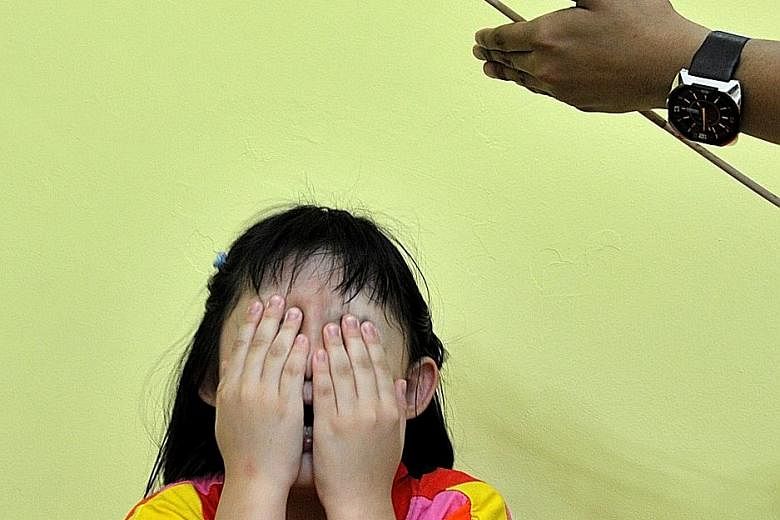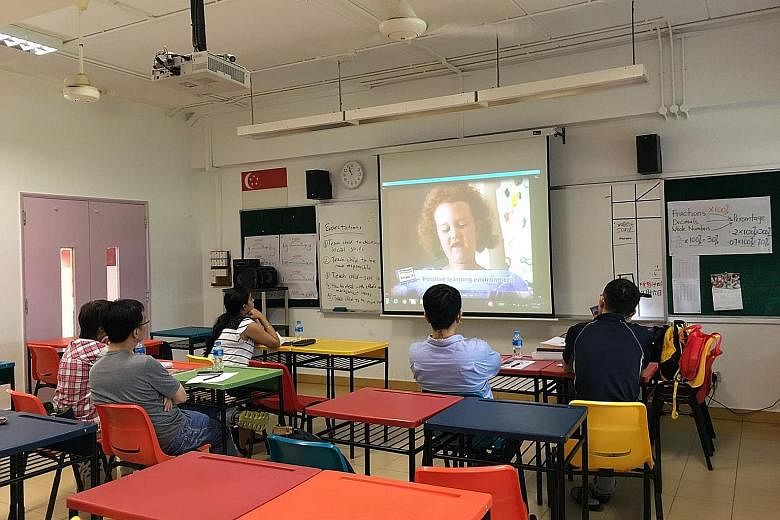Recently, a video of a couple hitting their daughter publicly in Jurong West with a cane and a tree branch went viral, prompting the mother to write to the media to apologise for her action.
She said her daughter had lied to her about homework and she "just exploded" as she could not believe that she had raised a liar.
The video, posted two months ago, sparked a debate on whether caning is the best way to discipline children.
Though caning is not so common here nowadays, it is still practised. And experts warn that corporal punishment can have a lasting psychological impact on the child.
CANING CAN HARM
Caning is used to instil fear in a child, thereby prompting obedience. But constant fear of the cane can tip a child into anxiety and depression, said Dr Jennifer Kiing, a senior consultant in the child development unit of the National University Hospital.
"If you cane a child, his stress level goes up. If his stress level goes up too frequently, his fear response becomes anxiety. And if his anxiety stays, it can become depression."
The more frequently or severely a child is hit or caned, the more likely he will have symptoms of depression or anxiety, said Dr Kiing.
One of her former patients, who was frequently caned for infractions, had developed an anxiety disorder by the time she saw him at the age of six or seven. He had problems making friends and coping in school.
The parents said they had started caning him from the age of two and, after a year or two of caning, he had become quite withdrawn.
Dr Kiing said: "Many parents don't realise that caning can have adverse long-term effects."
Studies have shown that corporal punishment is associated with aggressive and anti-social behaviours in later life, she said.
Children who are beaten repeatedly over time have higher rates of anxiety and depression, she said.
Being caned constantly may lead the child to believe that physical aggression is condoned, said Dr Lim Boon Leng, a psychiatrist at Gleneagles Hospital.
Such children often perceive themselves as being physically abused and this can have a lasting impact on their relationships with other people, he said.
Dr Lim has a 30-year-old patient who is estranged from her family and is depressed and irritable.
-
Triple P way to good parenting
-
A positive parenting programme in 149 primary and secondary schools here - the Triple P - has been shown in an evaluation study to lead to greater competence and lower stress for parents.
It also leads to fewer behavioural problems in children, said a spokesman for the Ministry of Social and Family Development.
Created in Australia, the programme is offered to parents of children in Primary 3 and 4, and Secondary 1 and 2. It will be expanded to 175 schools next year.
The programme is designed to help parents of children with behavioural or emotional problems, said Mr Francis Lee, an accredited Triple P trainer.
A primary school pupil may have difficulty waking up for school or refuse to tidy a messy room. For such problems, group training is offered.
A one-to-one approach is used for more challenging behaviour, such as young children telling lies, he said.
Mr Lee, who is also manager and senior counsellor at Touch Family Services, shares three tips from Triple P:
1. GIVE CLEAR INSTRUCTIONS
Parents often give lengthy or unclear instructions and assume the child understands what he should be doing.
For example, if a parent sees his child jumping on the bed when it is time for dinner, he may get angry and say, "don't be silly" or "don't do that" and walk away, expecting the child to know what to do next.
Instead, the parent should stay calm and say to his child: "Stop jumping on the bed. I want you to go to the dinner table and have your meal now."
2. DON'T NAG
Do not nag when you want your child to start a new task.
For instance, if you want him to stop watching TV or using his mobile phone and have dinner, ask him to do so. You can ask him a second time, in case he missed hearing you the first time.
If he still does not budge, take action. You can say: "Mummy's not going to nag at you. If you refuse to do what I said, I will turn off the TV or take away your mobile phone."
Remain calm and take control.
He will protest initially but once he knows that protesting does not work, he will not try it anymore.
3. BE AWARE OF YOUR EMOTIONS
Parents need to regulate their emotions. When they are stressed or angry, they should not discipline the child. Mr Lee said he knows a mother who was stressed at work and had problems managing her child. She was constantly calling him names such as cow and buffalo.
Name-calling can affect a child's behaviour, so she was asked to stop. Instead, she should stay firm and calm while disciplining him.
Parents should also not use vulgarities on their children, no matter how angry they are.
Joyce Teo
•Triple P is also available at the Chinese Development Assistance Council, Mendaki and the Singapore Indian Development Association and elsewhere. For details, go to www.triplep-parenting.net/glo-en/find-help/find-a-provider/
"She has intense animosity towards them and finds it hard to trust or relate to people," he said.
"As she was frequently punished and caned, she perceived that she was not loved."
Dr Lim said: "There is an association of physical punishment in childhood with depression in adulthood. So it is likely that the caning and perception of physical abuse had aggravated her depression."
Parents who use the cane habitually may not realise that they themselves suffer from anxiety and feelings of lack of control.
When a parent uses excessive force or corporal punishment more frequently than necessary, it may be a sign of increased irritability due to poor anger management, stress, anxiety disorders or depression, said Dr Lim.
DISCIPLINE OR ABUSE?
Dr Kiing said: "When you are disciplining the child and it's emotional, it's very hard to not overdiscipline him. There's a line that can be easily crossed."
Many child abuse cases are related to child discipline issues - the parents want to discipline the child but end up abusing him.
She said: "All parents want the best for their child but, sometimes, our emotions get the better of us."
Ms Ong Li Min, principal clinical psychologist at the child and adolescent psychiatry department at the Institute of Mental Health, said: "If you are not in good control of your emotions, you are likely to hit the child harder than you want to."
She added: "The child will react to this and the parents may lose their self-control."
Many parents use caning to discipline their child because that was how they themselves were brought up. Many subscribe to the idea that "to spare the rod is to spoil the child".
Ms Ong said the impact of corporal punishment on a child depends on the punishment, its frequency and his personality.
The parent-child relationship plays a big part in moderating the effects, she said.
But caning a child publicly is out. "We should try not to humiliate the child in public as it would affect his self-esteem," she said.
THE BETTER WAY
Physical punishment is essentially a lazy form of discipline as you are simply trying to silence the child with pain and fear, said Dr Lim.
If parents want to use corporal punishment to discipline the child, they should agree with him beforehand the circumstances in which caning will be used and the number of strokes, and provide him with the rationale before the punishment, he said.
Using the cane repeatedly - even lightly - is not an effective way to teach values as it attempts to do so by shaming the child, said Dr Lim.
This may lead to the child developing excessive guilt and low self- esteem, he said. "It would be better for the parents to spend more time explaining to the child the difference between right and wrong."
To discipline means to develop a child's maturity but not to hurt him, said Dr Kiing. Hurting a child ends in pain and guilt for everyone.
Positive parenting, where communication lines are kept open while parent and child think through issues together, is more constructive. It has been shown to be effective and leads to improved parent-child trust.
The key is to parent the child in a nurturing and non-hurtful way, said Dr Kiing. Parents need to find out why their child is behaving in a certain way. Children who are hyperactive or want to test the limits all the time should be evaluated, rather than caned.
But parents also have to be consistent in applying the positive parenting approach, especially in the Asian context, where there may be different caregivers for a child in a multi-generational household.
Parents must invest time to learn the best way to raise a child.
Dr Kiing added: "When you discipline a child, you can't do it in anger as it has the risk of becoming abuse."
If your child refuses to do his homework...
Children who are caned over schoolwork will associate fear with the cane, said Dr Jennifer Kiing, a senior consultant at the National University Hospital's child development unit.
"They will think, 'Oh my gosh, if I am not going to do this, I will be caned'," she said.
WHAT PARENTS CAN DO
Dr Kiing pointed out that all children want to succeed. She said: "If they are not succeeding, we have to understand the reason. What you don't want to do is to discipline in anger. Keep yourself apart from your child when you are really angry."
She added: "If a child is dyslexic, for instance, no amount of caning is going to help."
Ms Ong Li Min, the principal clinical psychologist at the Institute of Mental Health's department of child and adolescent psychiatry, said: "Parents should try to find out if the homework is too difficult or too much. If the child is overwhelmed by the amount of homework, let him do half of it before lunch and the rest after lunch."
If a young child is distracted by what is showing on television, she said, the parents should get him to do his homework in another room or let him watch TV during his rest time.
If a teenager wants to spend time on his mobile phone instead of doing his schoolwork, the parents can talk to him and share their concerns. They should also listen to their child's concerns, she said.
"Parents need to dig deeper. Why didn't he do his homework? Is someone bullying him? Does he have learning difficulties?" said Ms Ong.
"Discipline is more than punishment. You are training a child and you need to know what's your goal."
Joyce Teo



